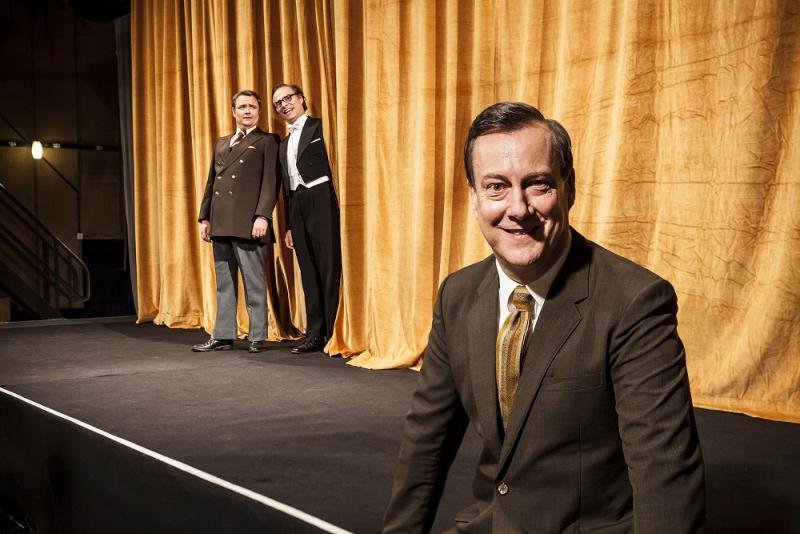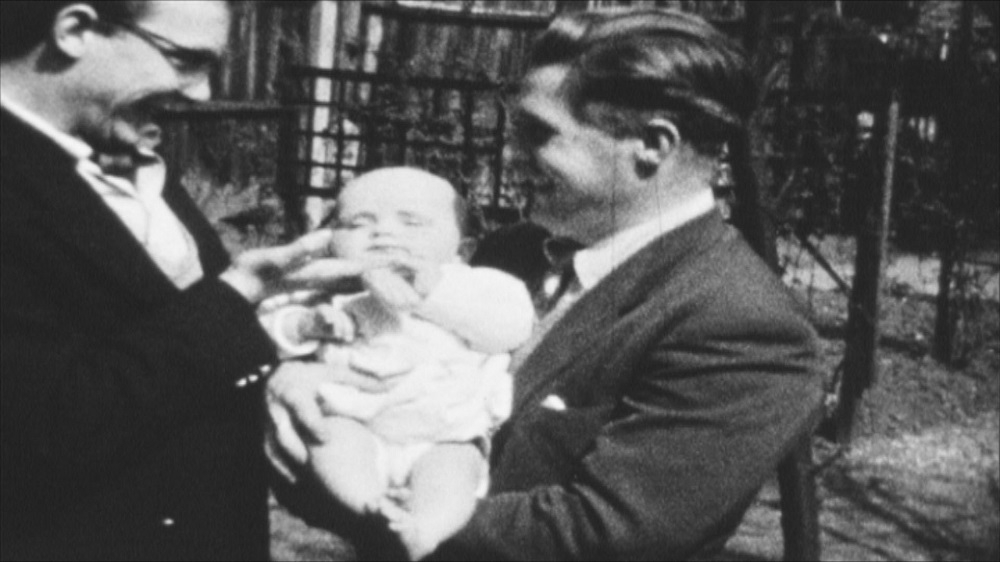Eric, Ernie and Me, BBC Four review - he brought them sunshine | reviews, news & interviews
Eric, Ernie and Me, BBC Four review - he brought them sunshine
Eric, Ernie and Me, BBC Four review - he brought them sunshine
The moving story of Morecambe and Wise's scriptwriter Eddie Braben, plus a gentle hour with Eric & Ernie's Home Movies

To misquote Marx (Karl, not Groucho), comedy repeats itself, the first time as farce, the second time as a tragedy. The early days of broadcasting bred comedians whose work lives on in the nation’s marrow. But being Frankie Howerd or Kenneth Williams or the Steptoe actors was no laughing matter.
The best of them was Eric & Ernie, written by Peter Bowker from an idea by Victoria Wood. It told the origin story of Morecambe and Wise, who were brought together by Eric’s mother (Wood) and endured an arduous apprenticeship at the dawn of television. Six years on, and made by completely different people, Ernie, Eric and Me (BBC Four) made for a modest, moving bookend.
The "me" in the title was Eddie Braben, the gagsmith credited with hoiking them onto the plinth which they have occupied ever since, culminating in their Christmas show in 1977 which attracted an astonishing 28 million viewers. (Put that in your pipe and smoke it, Simon Cowell.) The set-up of the drama was that by the late 1960s they were coasting, their scriptwriters had moved on and Eric’s ticker was playing up. In came Braben, a fruit and veg seller from Liverpool who had earned his spurs writing jokes for Ken Dodd.
The drama placed the two great stars in the unusual role of supplicants, even leeches, who entirely depended on an outsider for the life-giving fuel of material
It wasn’t in Neil Forsyth’s script but Braben first saw Morecambe and Wise as a teenager and later remarked that “they were so far down the bill I thought they were the printers”. He needed persuading, and told the pair the act should riff on their relationship, and thus make Ernie Wise more than a mere straight man. “I get 10 percent of the laughs and 50 percent of the money,” reasoned Ern, before his tiger wife overrode him. “Do it!” she told Braben.
The drama placed the two great stars in the unusual role of supplicants, even leeches, who entirely depended on an outsider for the life-giving fuel of material. Trouble with mental health, normally suffered by performers, was Braben’s cross to bear. Eric and Ernie exerted a powerful grip. In one accelerating sequence, he entered an exhausting Groundhog Day of writing, commuting to London on the sleeper and getting his scripts back with red ink all over them. In a literally graphic illustration of the writer’s search for inspiration, he drew a TV screen on the living room wall and waited for his characters to materialise inside it and start speaking their lines.
In truth, Braben's writer’s block and breakdown did not look intensely serious. But Stephen Tompkinson, such a livewire all those years ago in Drop the Dead Donkey, did his best to look knackered and demoralised. His lovely performance was nicely supported by Liz White as his wife, Dee. Neil Maskell’s Ernie cut a tougher figure than the one known to the public, while Mark Bonnar, whose career goes from strength to strength, went all out for pipe-chewing, glasses-wiggling accuracy. (Pictured below: still from Eric and Ernie's Home Movies, BBC/Shiver/Morecambe & Wise family/estates) The script called for a base level of knowledge of their oeuvre. Rather than recreate them, the famous sketches were seen in rehearsal or heard over the tannoy as Braben sat in corridors listening to live recordings. Trainspotters could enjoy an unflattering cameo for Barry Cryer, dying on his arse as a warm-up man. Fun was also had twitting a glamorous Glenda Jackson, a sultry Vanessa Redgrave (“Oi, Redgrave. What kind of socialist has a chauffeur?”) and, of course, Andrew Preview.
The script called for a base level of knowledge of their oeuvre. Rather than recreate them, the famous sketches were seen in rehearsal or heard over the tannoy as Braben sat in corridors listening to live recordings. Trainspotters could enjoy an unflattering cameo for Barry Cryer, dying on his arse as a warm-up man. Fun was also had twitting a glamorous Glenda Jackson, a sultry Vanessa Redgrave (“Oi, Redgrave. What kind of socialist has a chauffeur?”) and, of course, Andrew Preview.
How much of this really happened and how much was creative licence is one for the sticklers. Did Eric really have intimations of mortality in 1977? Another highly dramatic omission concerns Morecambe and Wise’s departure for ITV. The BBC's head of light entertainment Bill Cotton (here played by Alex Macqueen) wouldn’t allow them to poach the contracted Braben, who retaliated by headbutting Cotton, who hit him back with a soda syphon. That might have ruffled the gentle elegiac tone.
The mood was cheerful for Eric & Ernie's Home Movies, a companion programme which rifled through all the cinefilm both stars accumulated. Morecambe's children and widow, and various people who knew or worked with them, were vouchsafed the chance to watch material captured five or six decades before, and see their younger selves caught in a time capsule. This gentle hour made the point that not every genius is racked with melancholy.
more TV
 Blue Lights Series 2, BBC One review - still our best cop show despite a slacker structure
The engaging Belfast cops are less tightly focused this time around
Blue Lights Series 2, BBC One review - still our best cop show despite a slacker structure
The engaging Belfast cops are less tightly focused this time around
 Baby Reindeer, Netflix review - a misery memoir disturbingly presented
Richard Gadd's double traumas are a difficult watch but ultimately inspiring
Baby Reindeer, Netflix review - a misery memoir disturbingly presented
Richard Gadd's double traumas are a difficult watch but ultimately inspiring
 Anthracite, Netflix review - murderous mysteries in the French Alps
Who can unravel the ghastly secrets of the town of Lévionna?
Anthracite, Netflix review - murderous mysteries in the French Alps
Who can unravel the ghastly secrets of the town of Lévionna?
 Ripley, Netflix review - Highsmith's horribly fascinating sociopath adrift in a sea of noir
Its black and white cinematography is striking, but eventually wearying
Ripley, Netflix review - Highsmith's horribly fascinating sociopath adrift in a sea of noir
Its black and white cinematography is striking, but eventually wearying
 Scoop, Netflix review - revisiting a Right Royal nightmare
Gripping dramatisation of Newsnight's fateful Prince Andrew interview
Scoop, Netflix review - revisiting a Right Royal nightmare
Gripping dramatisation of Newsnight's fateful Prince Andrew interview
 RuPaul’s Drag Race UK vs the World Season 2, BBC Three review - fun, friendship and big talents
Worthy and lovable winners (no spoilers) as the best stay the course
RuPaul’s Drag Race UK vs the World Season 2, BBC Three review - fun, friendship and big talents
Worthy and lovable winners (no spoilers) as the best stay the course
 This Town, BBC One review - lurid melodrama in Eighties Brummieland
Steven Knight revisits his Midlands roots, with implausible consequences
This Town, BBC One review - lurid melodrama in Eighties Brummieland
Steven Knight revisits his Midlands roots, with implausible consequences
 Passenger, ITV review - who are they trying to kid?
Andrew Buchan's screenwriting debut leads us nowhere
Passenger, ITV review - who are they trying to kid?
Andrew Buchan's screenwriting debut leads us nowhere
 3 Body Problem, Netflix review - life, the universe and everything (and a bit more)
Mind-blowing adaptation of Liu Cixin's novel from the makers of 'Game of Thrones'
3 Body Problem, Netflix review - life, the universe and everything (and a bit more)
Mind-blowing adaptation of Liu Cixin's novel from the makers of 'Game of Thrones'
 Manhunt, Apple TV+ review - all the President's men
Tobias Menzies and Anthony Boyle go head to head in historical crime drama
Manhunt, Apple TV+ review - all the President's men
Tobias Menzies and Anthony Boyle go head to head in historical crime drama
 The Gentlemen, Netflix review - Guy Ritchie's further adventures in Geezerworld
Riotous assembly of toffs, gangsters, travellers, rogues and misfits
The Gentlemen, Netflix review - Guy Ritchie's further adventures in Geezerworld
Riotous assembly of toffs, gangsters, travellers, rogues and misfits
 Oscars 2024: politics aplenty but few surprises as 'Oppenheimer' dominates
Christopher Nolan biopic wins big in a ceremony defined by a pink-clad Ryan Gosling and Donald Trump seeing red
Oscars 2024: politics aplenty but few surprises as 'Oppenheimer' dominates
Christopher Nolan biopic wins big in a ceremony defined by a pink-clad Ryan Gosling and Donald Trump seeing red

Add comment